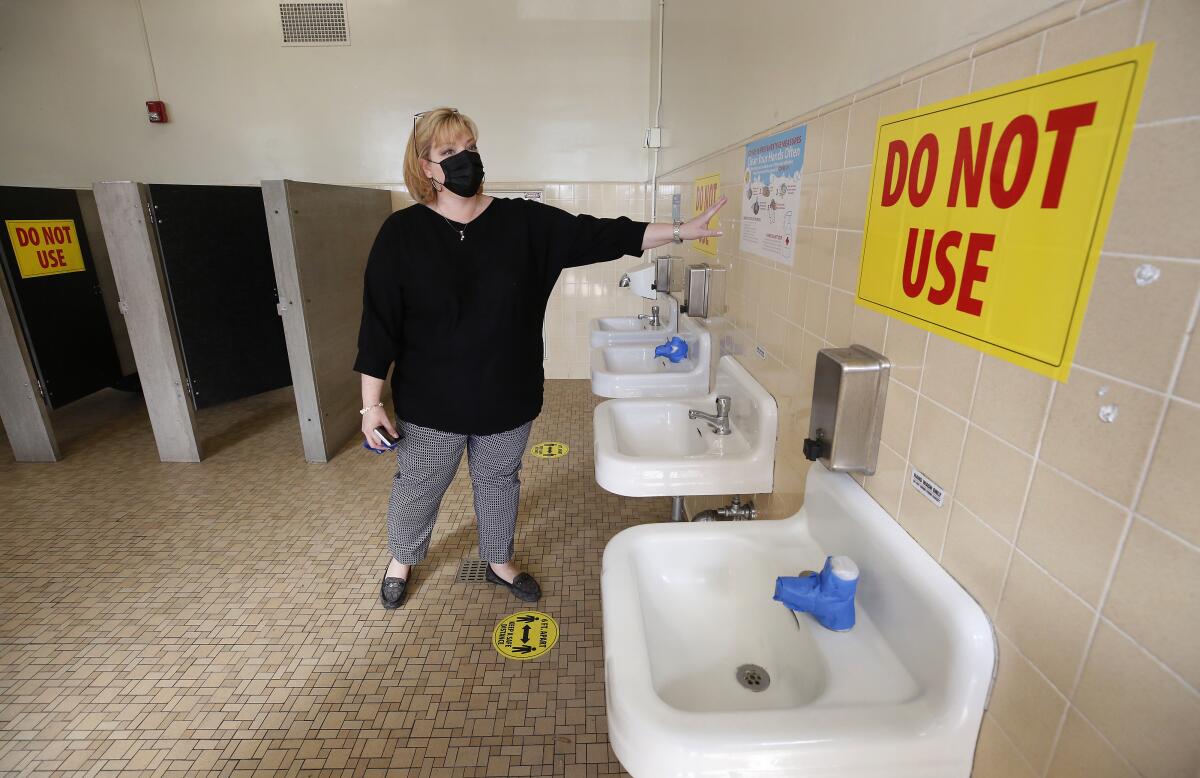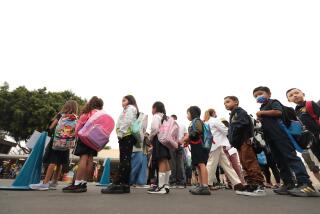L.A. Unified proposes a 2-week school year extension for student learning loss, trauma

- Share via
Los Angeles school officials will consider a plan to extend the next school year by adding one week at the start in August and another week in January after winter break to address learning loss and trauma suffered by students during the yearlong pandemic-forced school closures, Supt. Austin Beutner announced Monday.
.
The Board of Education for the nation’s second-largest school system will get a first look at the plan at its Wednesday meeting.
Beutner said that in a survey a majority of families expressed interest in extending the school year. Each of the additional weeks would be “split between time for teachers and school staff to plan and participate in additional training and time for students to process the trauma and anxiety they’ve experienced the past year and work on learning fundamentals,” Beutner said in his weekly broadcast.
In a school visit later that morning, he said the question of whether the extended school year would be mandatory for students is among the matters up for discussion.
As schools begin a phased-in reopening this week, the school board also will review other elements of the district’s academic recovery plan, which includes more reading and math teachers in elementary schools, more teachers in middle and high schools to reduce class sizes, extra staff for tutoring, additional mental health counselors and expanded services for students with special needs, such as those with disabilities.
District efforts will be supported by an unprecedented infusion of additional state and federal aid — more than $5 billion — although a significant portion of these funds are for school safety measures.
On Monday, Beutner appeared at public stops at four elementary schools, to showcase district preparations for the Tuesday arrival of kindergarten and first-grade students at 61 elementary and 11 early-education campuses.
While at Mack Elementary in Adams-Normandie he said that a lawsuit filed last week by a group of parents to halt mandatory coronavirus testing of students is “absolutely without merit.”
“I find it hard to believe that a self-proclaimed grass-roots organization would be asking us to make it less safe for students and staff who work at schools, and somehow claim they’re acting in the interest of students,” Beutner said.
The complaint asserts that it is illegal for the district to require coronavirus tests as a condition for returning to campus because heath authorities have not mandated the tests. L.A. County health department Director Barbara Ferrer said that last week that school systems could insist on such testing if they choose to. The suit also alleges that children have been illegally shortchanged by the district’s return-to-school plan and is seeking a court order to force the district to reopen “to the greatest extent possible.”
Beutner issued a coronavirus testing reminder to parents in his broadcast remarks.
“All students who return to campus for in-person learning must receive a COVID test the week prior to their school opening,” Beutner said. “For students returning to school the week of April 19th, please schedule your appointment sometime this week. And for students who are starting school this week, it’s not too late to be tested today.”
The district is extending the hours of existing testing sites, which are located throughout the vast school system. These centers will be open seven days a week, from 7 a.m. to 7 p.m., through April 25. For more information, families can call the district hotline at (213) 443-1300, go to the district website, visit a school testing center or call their child’s school.
The parents who sued over the testing also seek a fuller reopening of L.A. schools by returning to a more normal schedule
L.A. Unified will open under a hybrid format that continues to rely heavily on remote learning online. At the elementary level, students will learn in-person for half a day, spending the rest of the time working online or independently. At the middle and high schools, students also would attend campus half-time, but all of their core academic work will take place online even when they are in a classroom.
The first group of elementary schools will add older students as the week progresses. Other elementary schools will open in the same pattern next week, with middle and high schools in the week following that.
At Mack Elementary, about 45% of students will return to campus, principal Ana Guzman said.
She explained Monday that students will arrive and depart from campus according to a staggered schedule, and enter via two locations. Students attending in-person will be taught for three hours in the morning, and then some will go home while others will remain on campus for supervision that will extend as late as 4 p.m. Those staying on campus will eat outside at lunch tables, while those leaving will be sent home with bagged meals.
Students remaining online only will be taught live by their instructor during an afternoon session.
Districtwide, about 39% of elementary students will be returning, as will about 25% of middle school students and about 17% of high school students, according to survey results.
In his weekly broadcast Beutner also discussed the wind down of the district food distribution program for the community. The effort ultimately resulted in the district providing 122 million meals along with $40 million in donations — including diapers, books and toys.
April 9 was the last day for 22 of the school-based food centers; the remaining 41 will close Friday. Schools can provide referrals for families with an ongoing need for food aid, Beutner said.
“Behind each meal [was] a dedicated team of cafeteria workers, custodians, warehouse workers, truck drivers, school principals and staff and countless others — without whom none of this would have been possible,” Beutner said. “Together, we provided meals to all who needed them without question because we knew it was the right thing to do.”
More to Read
Sign up for Essential California
The most important California stories and recommendations in your inbox every morning.
You may occasionally receive promotional content from the Los Angeles Times.












